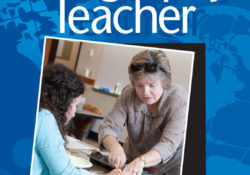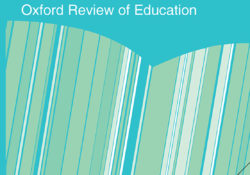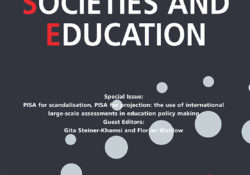tandfonline.com har udgivet en rapport under søgningen “Teacher Education Mathematics”: ABSTRACT ABSTRACT This article considers the implementation of Emojis as responses within survey research, measuring attitudes towards mathematics in children aged eight and nine years old. Participants answered two multi-item scales. The first required them to provide an Emoji to provide their responses to statements, whilst the second additionally required them to draw the Emoji they wished to use. The rationale was to allow children to feel more familiar with the common means of communication used in a ‘digital era’ in order to aid reliability and validity of thge measures. Evidence suggests that future research be carried out to measure and assess children’s attitudes with techniques from the current study to help them understand the nature of what is being… Continue Reading →
Like this:
Like Loading...
tandfonline.com har udgivet en rapport under søgningen “Teacher Education Mathematics”: Link til kilde
Like this:
Like Loading...
eric.ed.gov har udgivet: As the use of online courses in high schools increases rapidly across the United States, schools are using courses from a multitude of sources to achieve a variety of educational goals. Policies and practices for monitoring student progress and success in online courses are also diverse. Yet few states formally track or report student participation in online learning. Iowa and Wisconsin are among the states that do not track such information. This study analyzed data from a survey developed to describe how and why brick-and-mortar public high schools in Iowa and Wisconsin use online learning for their students. The survey, developed by Regional Educational Laboratory Midwest in collaboration with members of its Virtual Education Research Alliance, reflects the need for better information about the basic characteristics of… Continue Reading →
Like this:
Like Loading...
tandfonline.com har udgivet en rapport under søgningen “Teacher Education Mathematics”: ABSTRACT ABSTRACT Despite UNESCO’s Learning Cities agenda, which argues for the mobilisation of resources to promote education across all sectors and environments, there is little evaluative research on Learning City engagement which is both naturalistic and empirically rigorous. The research on informal adult learning in urban contexts is particularly sparse. This paper provides a case study of informal learning and lifewide literacies amongst Glaswegian adults using three distinct approaches to data collection: a household survey capturing rich data on learning attitudes, behaviours, and literacies; GPS trails that track mobility around the city; and the capture of naturally occurring social media. The work operationalises Learning City indicators, and explores domains beyond education, some of which have not previously been considered in… Continue Reading →
Like this:
Like Loading...
tandfonline.com har udgivet en rapport under søgningen “Teacher Education Mathematics”: Abstract Abstract In this overview piece, we document the six student perception surveys (SPSs) currently available for state, district, and school consumption and use, given SPSs are increasingly becoming one of the more popular “multiple measures” being used to evaluate teacher qualities. We present descriptive information about each of these SPSs, including information related to cost(s), constructs or domains assessed, number of items, response option types, grade level(s) in which the SPS can be administered, etc. Given this information, we also present implications for practice, as well as calls for future research into each SPS individually and writ large, given SPSs’ increasing popularity post the passage of the Every Student Succeeds Act (ESSA), and also given what consumers might need… Continue Reading →
Like this:
Like Loading...
eric.ed.gov har udgivet: Teachers play a critical role in establishing classroom and school environments that contribute to students’ social and emotional development. This paper explores whether we can estimate a classroom-level measure of student growth in SEL by applying value-added models to students’ [social-emotional learning] SEL. We analyze data from the 2016 and 2017 administrations of student self-report surveys, which contain responses from roughly 40,000 students in Grade 5 within five of California’s CORE Districts. We estimate separate value-added models for each of the four SEL constructs assessed–growth mindset, self-efficacy, self-management, and social awareness–and for math and [English language arts] ELA academic growth. We find across-classroom-within-school variance of students’ SEL outcomes, even after accounting for school-level variance. The magnitude of classroom-level impacts on students’ growth in SEL appears similar to… Continue Reading →
Like this:
Like Loading...
tandfonline.com har udgivet en rapport under søgningen “Teacher Education Mathematics”: ABSTRACT ABSTRACT This article is concerned with the early phase of international large-scale assessments. Drawing on media discussions before and after the release of the International Association for the Evaluation of Educational Achievement (IEA) surveys of 1973, the chapter discusses the relationship between international assessments, scandalisation, and de-scandalisation, with a specific focus on the interpretation of the comprehensive school reform in Sweden. The first section of this article deals with the early years of the 1970s, a time in which international data on education played a minimal role in educational discourse, creating space for other ways of discussing the perceived quality of schooling. The second section covers the effects of the IEA surveys released in 1973, whose positive results took… Continue Reading →
Like this:
Like Loading...




